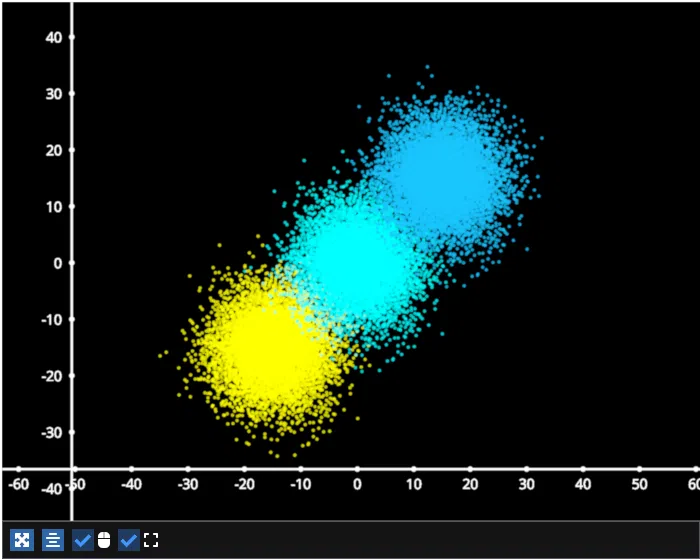Note
Go to the end to download the full example code.
Scatter Animation Colors#
Example showing animation with a scatter plot.

/home/runner/work/fastplotlib/fastplotlib/fastplotlib/graphics/features/_base.py:18: UserWarning: casting float64 array to float32
warn(f"casting {array.dtype} array to float32")
# test_example = false
import fastplotlib as fpl
import numpy as np
# create a random distribution of 10,000 xyz coordinates
n_points = 10_000
# dimensions always have to be [n_points, xyz]
dims = (n_points, 3)
clouds_offset = 15
# create some random clouds
normal = np.random.normal(size=dims, scale=5)
# stack the data into a single array
cloud = np.vstack(
[
normal - clouds_offset,
normal,
normal + clouds_offset,
]
)
# color each of them separately
colors = ["yellow"] * n_points + ["cyan"] * n_points + ["magenta"] * n_points
# create plot
figure = fpl.Figure(size=(700, 560))
subplot_scatter = figure[0, 0]
# use an alpha value since this will be a lot of points
scatter = subplot_scatter.add_scatter(data=cloud, sizes=3, colors=colors, alpha=0.6)
i = 0.05
def cycle_colors(subplot):
global i
# cycle the red values
scatter.colors[n_points * 2:, 0] = np.abs(np.sin(i))
scatter.colors[n_points * 2:, 1] = np.abs(np.sin(i + (np.pi / 4)))
scatter.colors[n_points * 2:, 2] = np.abs(np.cos(i))
i += 0.05
subplot_scatter.add_animations(cycle_colors)
figure.show()
# NOTE: fpl.loop.run() should not be used for interactive sessions
# See the "JupyterLab and IPython" section in the user guide
if __name__ == "__main__":
print(__doc__)
fpl.loop.run()
Total running time of the script: (0 minutes 8.253 seconds)
